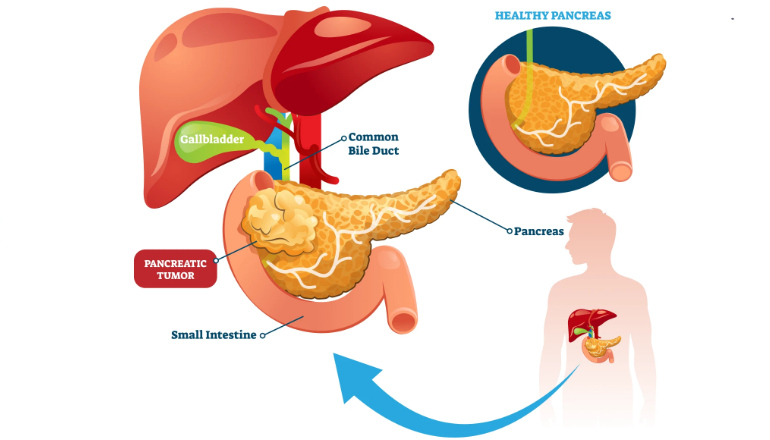
Understanding pancreatic cancer: Symptoms, causes, and prevention
By Dr. Avi Verma
Pancreatic cancer is a type of cancer that originates in the pancreas, an organ located behind the lower part of the stomach. The pancreas plays a crucial role in digestion, producing enzymes to aid food breakdown and hormones, including insulin, to regulate blood sugar levels. The most common type of pancreatic cancer is pancreatic ductal adenocarcinoma, which starts in the cells lining the ducts that carry digestive enzymes from the pancreas.
Unfortunately, pancreatic cancer is often diagnosed at an advanced stage, making early detection difficult and decreasing the chances of a cure. The lack of early symptoms is one of the reasons why it is typically discovered only once it has spread to other organs. Treatment options may include surgery, chemotherapy, radiation therapy, or a combination of these, depending on the stage of the cancer.
Symptoms of Pancreatic Cancer
The symptoms of pancreatic cancer are often subtle at first and may not appear until the disease is advanced. When symptoms do occur, they may include:
- Abdominal pain that radiates to the back or sides
- Loss of appetite
- Unexplained weight loss
- Yellowing of the skin and eyes (jaundice)
- Pale or floating stools
- Dark urine
- Itching
- New or worsening diabetes
- Pain and swelling in limbs due to blood clots
- Fatigue or weakness
What Causes Pancreatic Cancer?
The exact cause of pancreatic cancer remains unclear, but certain risk factors have been identified. These include:
- Smoking
- A family history of pancreatic cancer or inherited genetic mutations
- Chronic pancreatitis (inflammation of the pancreas)
- Type 2 diabetes
- Obesity
- Older age (most cases occur in individuals over 65)
- Excessive alcohol consumption
How Pancreatic Cancer Develops
Pancreatic cancer occurs when mutations in the DNA of cells in the pancreas lead to uncontrolled growth and multiplication. In healthy cells, DNA instructs the cell to grow and die at a specific time. In cancer cells, however, these instructions are altered, allowing the cells to proliferate rapidly and avoid the normal process of cell death, leading to a tumor. As the tumor grows, it can invade surrounding tissues and eventually spread to other parts of the body.
Most pancreatic cancer arises in the ducts of the pancreas, where it is referred to as pancreatic ductal adenocarcinoma. Other, less common forms of pancreatic cancer can develop in the hormone-producing or neuroendocrine cells of the pancreas, known as pancreatic neuroendocrine tumors.
Risk Factors for Pancreatic Cancer
Several factors can increase the risk of developing pancreatic cancer, including:
- Smoking
- Chronic pancreatitis
- Family history of pancreatic cancer
- Genetic conditions, such as mutations in the BRCA2 gene, Lynch syndrome, or familial atypical multiple mole melanoma (FAMMM) syndrome
- Obesity
- Type 2 diabetes
- Advanced age (most individuals diagnosed are over 65)
- Heavy alcohol use
Complications of Pancreatic Cancer
As pancreatic cancer progresses, it can lead to various complications, including:
- Weight Loss: The cancer consumes more energy, and side effects from treatment may make it difficult to eat. The pancreas may also fail to produce enough digestive juices, affecting nutrient absorption.
- Jaundice: Cancer that blocks the liver’s bile duct can cause jaundice, which results in yellowing of the skin and eyes, dark urine, and pale stools. This can occur without abdominal pain.
If a bile duct is blocked, a procedure called endoscopic retrograde cholangiopancreatography (ERCP) can be used to insert a stent to keep the duct open.
- Pain: As tumors grow, they may press on nerves, causing significant abdominal pain. Pain can often be managed with medication, and treatments like chemotherapy and radiation may provide relief.
- Bowel Blockage: Pancreatic cancer can block the small intestine, making it hard for food to pass through. Stents or surgery may be needed to clear the blockage.
Prevention and Screening
Currently, there is no known way to prevent pancreatic cancer, but there are steps you can take to reduce your risk:
- Stop Smoking: Smoking is a major risk factor for pancreatic cancer. If you smoke, talk to your doctor about ways to quit.
- Maintain a Healthy Weight: Aim for a balanced diet rich in fruits, vegetables, and whole grains. Regular exercise can help manage weight and improve overall health.
- Limit Alcohol Consumption: Excessive drinking increases the risk of pancreatic cancer, so it is advisable to consume alcohol in moderation.
For individuals at high risk (due to family history or genetic factors), screening may be recommended. Screening involves imaging tests, such as MRIs or ultrasounds, to detect signs of pancreatic cancer before symptoms appear. Genetic testing can also identify inherited mutations that increase the risk of the disease.
Conclusion
While pancreatic cancer remains one of the most challenging cancers to detect early, advancements in treatment and screening are helping to improve outcomes. Awareness of symptoms, early consultation with healthcare providers, and adopting a healthy lifestyle can help manage risks. If you have concerns about your risk or family history, it’s essential to discuss them with a healthcare professional to explore possible testing and preventive measures.
As always, early detection remains critical, so stay vigilant and prioritize regular health check-ups.
Disclaimer: This information is provided as general knowledge about pancreatic cancer and is not a substitute for professional medical advice. Please consult your physician for proper diagnosis and treatment.